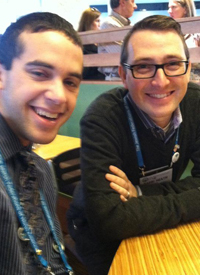First initiative of its kind aims to strengthen spiritual home for an estimated 1,000 Jews on campus

A taste for caffeine wasn't in the job description. Neither was the ability to wield a mean pool cue.
But both are coming in handy as Heath Watenmaker settles in as the first Reform outreach initiative rabbi at Rutgers Hillel – maybe even, the first in the country.
“I see it as part of my duties to meet students where they are, whether in the dorms or in the dining halls,” says Watenmaker, whose goal this first year was to bring Reform Judaism to as many venues as humanly possible, including 100 one-on-one coffee meetings throughout the New Brunswick and Piscataway campuses.
Reform Judaism (also known as liberal or progressive) is one of the major movements within Judaism; the religion also includes Orthodox, Conservative, and Reconstructionist Judaism within its wide umbrella. Although a core belief in God is inherent throughout the denominations, followers differ in terms of their level of observance and their lifestyle.
The Los Angeles native arrived at the Rutgers Hillel building on College Avenue last August as a newly minted rabbi. His mandate: to help provide a spiritual home to an estimated 1,000 Reform students on campus, roughly one-seventh of the overall Jewish population.
Several Reform congregations in New Jersey created and funded the position to reach out to their congregants on campus, and to provide a welcoming presence to all Jews from a Reform background, whose needs are slightly different from Jews from other backgrounds, Watenmaker says.
“I’m trying to show students the things Reform Jews can do based on our liberal sensibilities – things like introducing new music into our Sabbath prayer, exploring Jewish liturgy in new ways, and celebrating the diversity of Jewish life by creating a welcoming, non-judgmental environment,” Watenmaker says.
Because his position is so new – and so unusual -- he has no blueprint to follow. But the results in his first few months have been satisfying.
Bi-weekly Thursday Torah study sessions, which look at Biblical texts through a liberal lens, draw 10 to 15 students to hear Reform rabbis from throughout the state. Regular attendance at Reform Sabbath services has increased three-fold over previous years, and a conversation-based program dubbed “Dunkin’ Discussion” at the Douglass and Livingston student centers draws students eager to delve into such meaty topics as what does it mean to be a Jew in the 21st Century, and what role does faith play in one’s life.
Watenmaker has also been known to arrange Sabbath dinners in the Douglass and Livingston student centers, and to play a round of pool in a dorm lounge while chatting about the Jewish sages or quoting from the Ethics of the Fathers, a collection of the teachings of early rabbis.
As part of his outreach to the LGBT population on campus, Watenmaker recently collaborated with Hillel’s Jewish Allies and Queers group to take students to an LGBT synagogue in Manhattan for insight into what he called “a vibrant, openly gay Jewish community.”
Recently, he facilitated a partnership with Garden of Eden, a student-run sustainable farm, as part of the observation of Tu B’Shvat, the Jewish holiday celebrating trees and nature. The program explored the holiday’s ties to the environment and the Jewish imperative to take care of the Earth, Watenmaker says.
A self-described “Valley boy,” Watenmaker received a bachelor of arts degree in English and a master’s in social work from the University of Southern California. He earned a master’s in Jewish communal service from Hebrew Union College before being ordained at HUC in May 2011 – on the same day his son, Ilan Theodor, was born.
“I imagine not many people can say that their first act as a rabbi was to become a father, but I did,” Watenmaker says.
He and his wife Amy, a second-grade teacher in a Jewish day school in West Orange, live in New Brunswick.
The position of Reform outreach rabbi is funded through donations for at least three years; Watenmaker hopes it will become a model for campuses nationwide, especially larger public universities where the emphasis is on diversity and civic engagement.
“College is a time when people are searching for their identity – intellectually, academically, socially,” Watenmaker says. “My job is to help them explore who they are as Jews as well.”